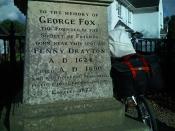Society of Friends
History of the Society of Friends
The Society of Friends (more commonly known as the Quakers ) was founded in the 1650's by George Fox, an English "nonconformist religious reformer." Born 107 years after Martin Luther sparked the Protestant Reformation, Fox's religious upbringing was shaped by the Reformation, the upheavals the Church of England experienced as it flip-flopped between Catholicism and Anglicanism, and 16th Century Calvinism. At age nineteen, Fox began a four year spiritual quest which ended when he experienced a "direct call from God" to preach the concept of the "Inner Light."
Fox taught that the Inner Light meant that each person, regardless of gender or station in life, contained an element of God's spirit. He taught that each person has direct access to God, that there was no need for separate priestly classes because all believers shared a communal priesthood, churches were not necessary, and that religious ceremonies, rituals, dogma, and creeds were merely empty forms that should be abolished.
Fox argued that the teachings of early Christianity were corrupted when the church became institutionalized. He taught that everyone has within him or herself the "same power to teach, to heal, and to prophesy that the Apostles had."
Early Quaker spirituality reflected many Anabaptist ideals. They felt that the essence of Christian belief should be "obedience to God's demands for purity of heart, honesty, simple dress, and separation from the state and war-making." They practiced a form of quietism. They sought peace, quiet, order, and prosperity. They worshipped together at regulated monthly and yearly church services called "Meetings," had charismatic ministers, and practiced extemporaneous preaching. Meetings were often held in silence so they could hold "individual communion with the presence of God dwelling in their midst." Members spoke only if they felt moved...


